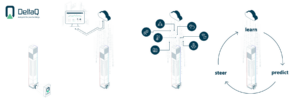
Our Q&A series is an opportunity for our European team, headed up by Dilan Omari to discuss all things PropTech, Start-ups, and Career with different founders from across the continent. Each week we will ask PropTech innovators burning questions and quiz them about their product, we hope you find it insightful and enjoy getting to know the founders as much as we have.
This week we have been in touch with Khadija Nadi, CEO at DeltaQ.
DeltaQ is a cloud-based energy optimization solution that applies predictive techniques to the steering of the HVAC of commercial buildings, leveraging weather forecast and AI thermal models of the building.
Its open architecture integrates with existing Building Management Systems and PropTech platforms. It helps real-estate professionals reduce CO2 emissions on average by 25% and realize energy savings while maintaining comfort to users, improving their operational efficiency, and increasing their assets’ value.
Founded in 2019, DeltaQ is a SaaS company with more than 35 employees operating in Europe and Asia.

After working in different roles as a business and innovation senior executive, I started my own company. I began helping start-ups and scale-ups that positively impact the world, particularly in social inclusion and climate change.
While working with Piet Colruyt, founder of Impact Capital, I discovered DeltaQ. I realized that buildings are responsible for almost 40% of global CO2 emissions. Because of the Green Deal, companies have to transition fast towards CO2 neutrality. I learned that DeltaQ could save around 25% of CO2 emissions within commercial buildings by ‘simply’ steering HVAC systems more smartly. It is the first, quick step towards achieving climate goals and has enormous potential. That is why I decided to join the team as co-founder, and I am currently working as its CEO.
As DeltaQ’s Chief Executive Officer, my job is to compile a clear vision for the ‘company’s future and our role in the energy transition. Crucial to my role is:
As I always say, our main target for the company is to build a continuous learning culture, stay focused, and become better at what we do every day.
Real estate is responsible for almost forty percent of global CO2 emissions and has less than eight years to reduce its carbon footprint by 55% in 2030. This target means reducing 7% CO2 each year.
As a company, we are impact-driven, but we are not only romantic people who only aim to save the planet. We also understood early on that there is a financial risk for the industry if it doesn’t comply with the CO2 targets.
From the start, what was clear to us is that there is a clear need to build a solution with a low/no CAPEX. The solution needs to be highly scalable on a total building portfolio and communicates with different building management systems. It needs to deliver quick, demonstrable results regarding energy savings and CO2 savings.
There were already a lot of solution providers working purely on monitoring and data visualization. These companies are doing a great job and are natural partners for us, but we wanted to go a step further and not only monitor and visualize data.
DeltaQ also actively steers a building’s HVAC controls by functioning as an autopilot, updating every 5 minutes. Using our technology helps the industry become compliant with CO2 regulations. We have committed ourselves to clear results: energy savings, operational efficiency, and comfort improvement from the start.
For DeltaQ, as well as for PropTech companies in general, two challenges stand out.
One of the challenges is the increasing pressure of achieving CO2 targets while not being aware of the connection between decreasing your carbon footprint and the potential of digitization, data, and/or AI. There is this assumption of the industry that reducing its carbon footprint means implementing high CAPEX solutions, like insulation and solar panels, that aren’t quickly implemented, are very intrusive, and have a slow return on investment.
The second challenge is selling your product in a sector where you need the buy-in of many stakeholders per building. Therefore, your product needs to add value to all stakeholders. Also, you need access to the different people and information involved in the complex stakeholder landscape. And then you need to get them on the same page. You need to define roles and timelines, precise stakeholder management, transparent processes, and project management are crucial for decision-making, implementing your technology, and delivering results.
Our customers particularly like the fact that we combine our focus on technology and impact with our strong focus on exchanging knowledge and stakeholder management. Too many other suppliers only focus on technology, which creates a misfit between their offering and the customer landscape. To work with our clients long-term, we need to keep having conversations and adjust our offering to add the most value possible.
The real estate sector is under much pressure to reduce its CO2 emissions. We are a natural partner to help our customers towards net-zero carbon with our triple strategy.
Firstly by reducing ‘buildings’ energy consumption by implementing our technology on building portfolios
Secondly, by preparing for grid interaction: moving towards more renewable energy is crucial and will need grid balancing technology. We are preparing for grid interaction while keeping our core focus: reduce energy consumption without compromising the ‘users’ comfort.
Thirdly, by advising on the carbon return of retro-fit investments.
Everything we do needs to help the commercial real estate sector drastically reduce its carbon emissions. We start with connecting building portfolios with our AI solution and commit ourselves to clear results: CO² and energy reduction, operational efficiency, and comfort optimization. Therefore, our first and foremost focus is to scale fastly.
Due to stricter sustainability rules, buildings in Europe must meet more stringent requirements to save 55% CO2 by 2030. The demand for solutions to achieve this goal will ensure strong growth for PropTech and DeltaQ and further reduce the CO2 of real estate.
Next, the workplace will not go back to what it was pre-COVID. Building owners are under a lot of pressure to meet the flexibility demands of their tenants. Because of restrictions and hybrid work, offices are often (half)empty. PropTech can play a big part in improving energy efficiency in these spaces. For example, DeltaQ technology decreases energy costs for HVAC systems by twenty to twenty-five percent. For asset managers and building owners, this means an improvement of their portfolios’ value proposition.
Also, the demand for solutions that increase energy efficiency will increase this year due to high energy prices. Increasing efficiency is the first step to saving on operational costs. PropTech plays a significant role here because it can be a quick and easy solution with a high return on investment.
Firstly, about ninety percent of today’s buildings will still be there in 2050, so your product offering must be future-proofed. For facilities to be competitive in 2050, there are many challenges to be leveraged, like digitization, energy optimization, and waste management. When entering the PropTech industry, you cannot serve all those needs. Therefore: choose your focus area and become the best supplier in this area.
Secondly, there isn’t one product or technology that offers THE solution, especially when complying with the Green Deal. Real estate will always need insulation, efficient heating and cooling, and smart lighting. To provide a total solution to professionals managing real estate and the industry, having partnerships and working together is vital. Especially when it comes to net-zero goals: in the end, we all work towards the same goals, and we need each other. Not only to satisfy our customers but also to have a more significant impact on our future planet.
And lastly, take the time to get to know the complexity of the market. It will be a bottleneck if you don’t align your business with the market, real estate stakeholders’ challenges, the legal environments, (inter)national health and CO2 requirements, etc.
LMRE are specialist PropTech recruiters, if you need help growing your business or making any key hires please get in touch via the form below!

"*" indicates required fields